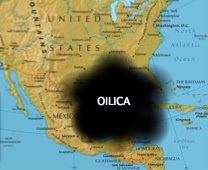MURDER, POLITICS, AND THE END OF THE JAZZ AGE
by Michael Wolraich
Order today at Barnes & Noble / Amazon / Books-A-Million / Bookshop

|
MURDER, POLITICS, AND THE END OF THE JAZZ AGE by Michael Wolraich Order today at Barnes & Noble / Amazon / Books-A-Million / Bookshop |
 June 16, 2030
June 16, 2030
Twenty years after President Barack Obama vowed to fight the massive underwater oil spill in the Gulf of Mexico "with everything we've got for as long as it takes," the U.S. government has formally surrendered to the spill. In a brief ceremony on a Louisiana hilltop overlooking a sea of black ooze, President George Prescott Bush signed a peace treaty that conceded almost 500,000 square miles of U.S. territory to the oil spill's dominion, including fishing and mineral exploration rights for the entire Gulf Coast.
After the signing, the President held a brief press conference in which he announced, "It's always sad for a country to lose its sovereign territory, but let's be honest, these were not our best states. At this point, we need to cut our losses and move on to more pressing matters like tax cuts."
The treaty is unlikely to affect last year's financial settlement with BP, the company that created the spill in 2010. After years of court battles, BP finally agreed to the government's original demand of $500 billion. While the amount is substantial by 2010 standards, rampant inflation has devalued the sum to slightly less than the cost of a movie ticket.
Critics across the country assailed the treaty. Gov. Bobby Jindal, the governor in exile of Louisiana, lambasted Bush for abandoning the former Gulf States to the "cruel and callous tyranny of an unelected force of nature." Sen. Bobby Kennedy III (D-MA) compared the treaty to Nazi Germany's annexation of the Sudetenland, arguing, "Like the appeasement of Hitler, this unilateral concession will only whet the spill's appetite. It will not stop until it has subjugated our entire country to its oily agenda."
According to the government's estimate, which has been repeatedly corrected upwards for the past twenty years, the oil is spilling out into the Gulf at a rate of 300 million barrels a day. If the spill abides by the terms of the treaty, it's not clear where the surging oil will go. Some fear a rapid escalation of illegal oil flow to other parts of the country. Illegal oil has flowed up the Rio Grande and Mississippi rivers or been guided across the desert by highly paid couriers known as "Pelicans." Arizona has reacted strongly to the influx with a new law that allows police to check waterfowl for illegal crude and forcibly repatriate them to oil territory.
While Mexico is still officially at war with the oil, the country has essentially become a vassal state of the spill. Corrupt oil is suspected of manipulating the Mexican government and taking over the lucrative drug trade. Its influence has also been seeping into Central America, aided by its ally, President Forever Hugo Chavez of Venezuela, who has praised "the glorious liberation struggle of our magnificent carbon-based comrade."
News From the Future is a series of dagblog.com exclusives about events that have yet to occur. We've received the articles through a glitch in the blogosphere known as a bunghole. Previous headlines:
| Attachment | Size |
|---|---|
| 22.72 KB |
Comments
You speculate, Genghis, about where the surging oil spill will go once it's filled the gulf to the brim. My guess is it will follow the path of least resistance -- north up the NAFTA superhighway to Alberta, where it can pollute the tarsands with impunity (and free of import taxes).
Since the whole point of tarsands technology is to get oil to mix with water, then separate oil from water, the Albertans can hardly complain about an influx of oil that's already pre-mixed with water. Also with lots of dead fish and waterfowl, but I'm pretty sure they can filter those out.
It's win-win. The oil finds a jurisdiction that actually welcomes it, and (once it's processed) Alberta gets to ship the stuff back south at a profit. And we all get to forget about this clean-energy nonsense for another 50 years or so.
by acanuck on Wed, 06/16/2010 - 5:26pm
I see that you have access to the bunghole to the future. So basically, Canada will become a sanctuary country for illegal crude. Doesn't surprise me.
by Michael Wolraich on Wed, 06/16/2010 - 7:15pm
Ha! You'll welcome that oil back with open arms once we've scrubbed all that filthy water out of it. Don't deny it.
by acanuck on Wed, 06/16/2010 - 10:15pm
by quinn esq on Thu, 06/17/2010 - 2:21am